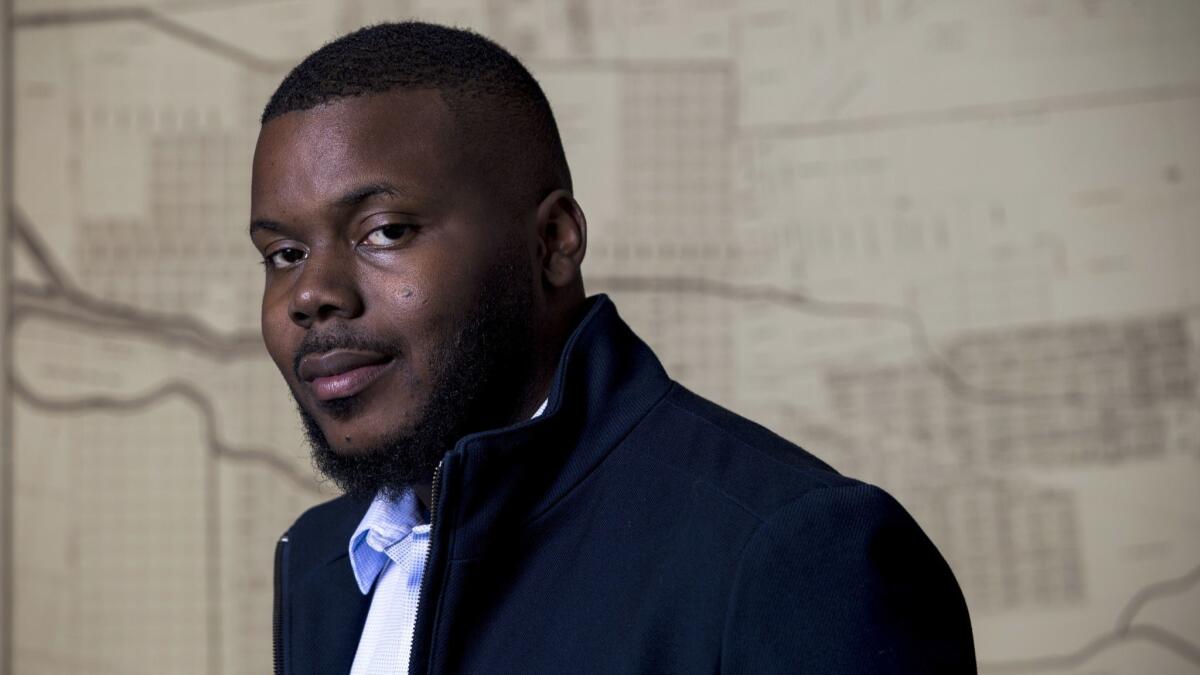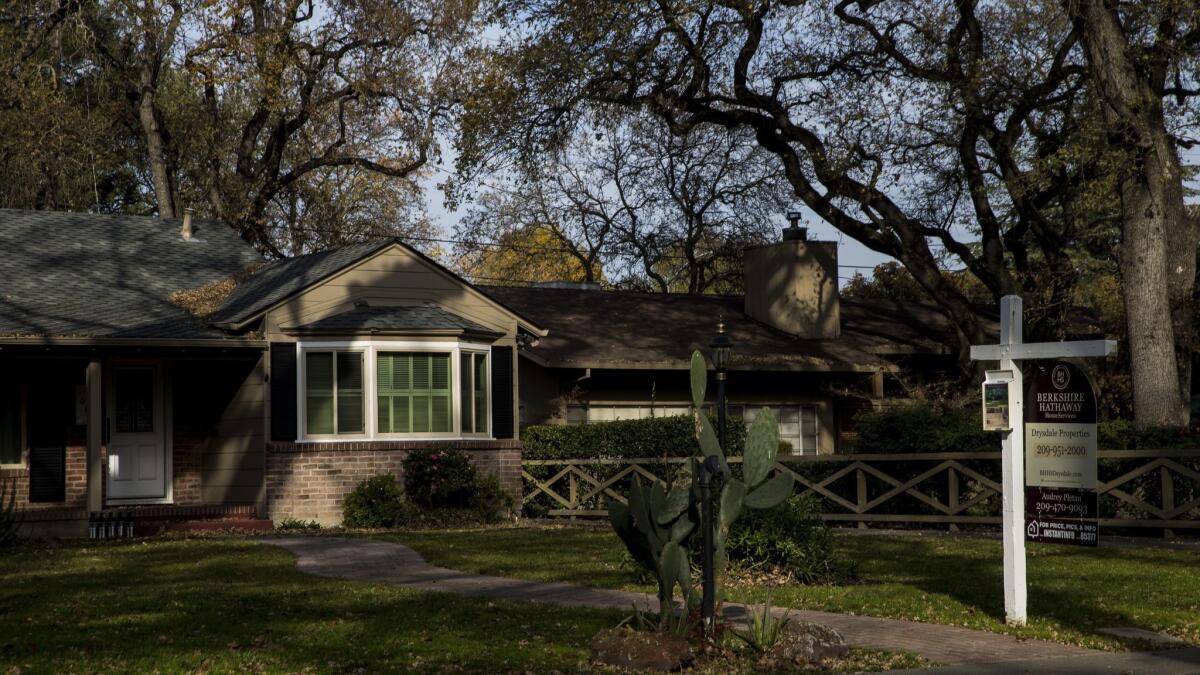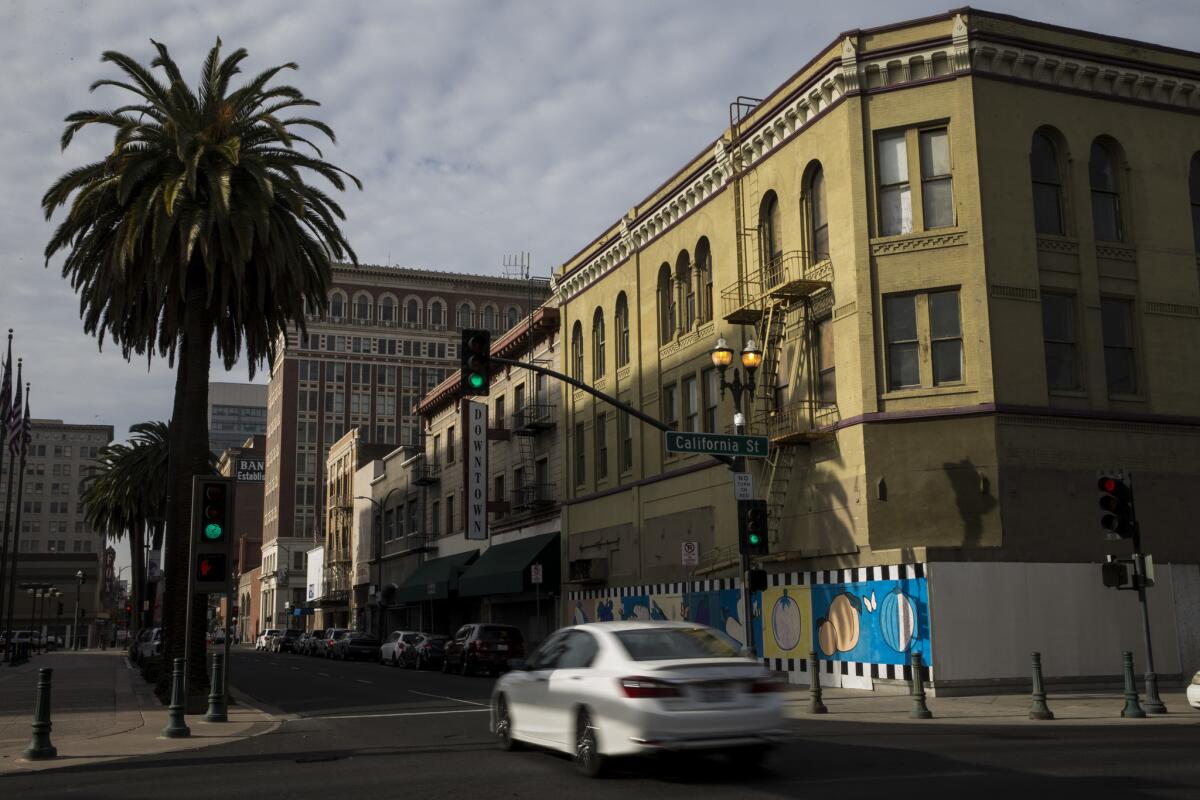Column: Stockton’s young mayor has bold turnaround plan: Basic income and stipends for potential shooters

Stockton Mayor Michael Tubbs says that for way too long, his city has been known for headlines about bankruptcy, violent crime and the housing collapse.
In the future, he wants it to be known as a place willing to test bold solutions.
Bold, and a little controversial.
Tubbs, a Stockton native and Stanford graduate who is all of 27 years old, wants to give at least $500 a month to a select group of residents. They’ll be able to spend it as they wish, for 18 months, in a pilot program to test the impact of what’s called guaranteed basic income.
If the very sound of that knocked you half off your chair, this next initiative might finish the job.
Stockton is about to award stipends of up to $1,000 a month to residents deemed most likely to shoot somebody. This program is called Advance Peace, and it’s modeled after a crime reduction program in the Bay Area city of Richmond.
The idea is that a small number of people are responsible for a large percentage of violence, and offering them an alternative path — with counseling and case management over an 18-month period, along with a stipend if they stay the course — can be a good investment all around.
“Let me be clear, Advance Peace is not a get out of jail free card,” Tubbs wrote in explaining the program on Stockton’s public safety website. “Participating in this program doesn’t erase the past, but it does help these young men learn how to make better choices for their own and our community’s collective future.”
There’s a difference between a vision and a hallucination, and time will tell with Tubbs. But I like the young man’s mix of rebelliousness, impatience and willingness to take risks.

We met last year when I wrote about how Stockton had gone from housing collapse to housing boom. Workers in Silicon Valley and the San Francisco-Oakland area, driven out of the cuckoo housing markets in those communities, have snapped up cheaper properties in Stockton, accepting the bargain of killer commutes.
But Stockton still suffers the crushing burdens of poverty, crime and now the rising rents and home prices that come with gentrification. For those who don’t have the education or training to work 60 miles away on tech’s front lines, Stockton still struggles to develop jobs that pay a living wage, and I paid the mayor another visit last week to talk about his plans for residents whose most pressing problems have not lifted.
“We get 50 constituents a week, if not more, calling and emailing us to explain why they would benefit” from a $500 monthly stipend, Tubbs said. “It’s heartbreaking that they’re asking, but it’s also exciting that we can do something for these people.”
“Exciting” is not the way everyone describes the program.
“You’ve got to be kidding,” Sarah Palin, former Alaska governor and vice presidential running mate, tweeted last month.
But Tubbs responded with a Twitter touche.
“Actually modeled after the Alaska Permanent Fund,” he wrote. “Are you familiar with it?”
The Alaska fund shares the wealth on state oil revenues, awarding residents roughly $2,000 a year.
The first thing you need to know about Stockton’s stipend plans is that taxpayers aren’t footing the bill. Nor will they pay for Tubbs’ “Stockton Scholars” program, which will tap a $20-million grant from the California Community Foundation in an effort to triple the number of Stockton students who go to college.
“I firmly believe that talent and intelligence are universal, but resources and opportunities are not. Stockton Scholars is born out of that belief,” Tubbs said when he introduced the program this year.
Tubbs said that when he became mayor last year, he had a habit of sending late-night emails to a crack team of volunteer research assistants. One night he asked them to look into novel ways to attack poverty.
“They came back with guaranteed income,” said Tubbs, and it jogged a memory for him. In college, he read Dr. Martin Luther King Jr.’s book “Where Do We Go From Here: Chaos or Community,” in which King promoted a guaranteed annual income.
So the idea of stipends isn’t exactly new — Canada and Finland have tried it; Oakland has a pilot program — nor is it exclusively a liberal pipe dream. In some form, the pitch has supporters and detractors on both the right and the left, although on the right, it’s often framed as a substitute for existing safety net programs.
Facebook’s Mark Zuckerberg and Space X’s Elon Musk have both pitched the idea in terms of inevitability, given the growing income gap and the threat of massive job losses because of automation.
Tubbs attended a San Francisco conference on those very topics last year and met Natalie Foster of the Economic Security Project, whose ambitious goal is to find ways to lift people out of poverty and to rebuild the middle class. Foster co-chairs the project with Facebook co-founder Chris Hughes.
“One thing we wanted to do was spur our first mayor-led demonstration project in the U.S.,” said Foster, who began working on the details with Tubbs and expects Stockton’s program to begin early next year.
As small as the program will be, it’s not going to dramatically affect many Stockton residents, but the goal is to get a sense of whether such an infusion on a broader scale can significantly alter lives and boost the economy. Still to be worked out are details on who will be eligible and how recipients will be selected. Mayor Tubbs said he wants middle-class residents to be eligible, because lots of people making $50,000 to $60,000 a year struggle to get through each month.
To those who say there’s dignity in work, and that free money might remove the incentive, Tubbs notes that he grew up poor despite the efforts of an overworked mother. A large percentage of Stockton’s poorest people have jobs, he said, but no economic security.
“Working 12 to 14 hours a day and not being able to pay the bills creates more stress than dignity,” he said.
Tubbs said what he’s heard from residents is that if their number comes up, they won’t use the extra $500 a month to buy a new car or television. They’ll pay bills. One mother said it would help with inflated food and utility costs when her kids come home from college for the summer.
“Or it pays for child care so you can work more,” said Tubbs. “Or you could work less and spend more time with the kids, or take care of your sick parents, or pay for your rising rent.”
Jason Furman, a Harvard professor and former economic advisor to President Obama, is no fan of this idea. He said he’d prefer wage supplements or tax credits over the awarding of money with no strings attached.
If the goal is to eventually make guaranteed income a publicly funded program, Furman said, the necessary tax increase would be huge “and unlikely to materialize.” And if it did, programs that pay for specific needs might get shredded. Furman also believes the better approach would be to develop a new economy of better-paying jobs and find ways to encourage work, rather than surrender to the threat of automation.
Natalie Foster had an answer for that.
“You shouldn’t live in poverty in the richest country on earth at the richest moment in time,” she said. “It’s not a question of where the money comes from. It’s a question of political will, and there are a number of ways to finance it, from fees on the people making millions shuffling paper on Wall Street to a carbon tax.”
Well, let’s see how it goes in Stockton first. I’m not quite ready to pay a tax to fund this kind of a giveaway, but as long as this is a small demonstration project financed by private and nonprofit sources interested in greater distribution of the wealth, why not?
Even under those terms, it’s easy to find those in Stockton who can’t believe what sounds to them like liberal claptrap, and they’ve got plenty of reasonable questions.
What if people use the money for drugs? Why won’t they be required to work or perform a public service? And don’t we already have welfare?
“I think it’s not smart,” said insurance agent Evelyn Vega, who wouldn’t mind it so much if the free money went to people with legitimate need, rather than being awarded randomly and without requirements. “After Bill Clinton passed the welfare-to-work act, my mom had to go back to school and it eventually motivated her.”
“Obviously, it’s a dumb idea,” said deli operator Robin Luna-Gonzalez, who was referring to the Advance Peace initiative. She said she has an autistic son whose care center is closing in a budgetary crunch.
“Why are we paying criminals?” she asked.
Her husband, James Gonzalez, said he thinks automation will create some jobs as it eliminates others. He might be open to the concept of supplemental pay if it’s aimed at education or job training, but not if it’s do-whatever-you-want cash, green and easy.
“We already give away billions of dollars to people who sit at home on welfare and make no effort to work,” he said.
Herk Washington, Mayor Tubbs’ barber, told me he and his wife do well and don’t need an extra $500 a month. But he showed me the bus schedule that has his $2 off haircut coupon for transit riders, and told me when he rides the bus, he talks to a lot of people barely getting by. And supplemental income has been a hot topic in his clip shop.
“There was a man sitting in that chair right there, a hard-working man, and he said he could use the help,” said Washington, who hadn’t known about the man’s financial struggles until that day.
Washington said he’s all for the stipend, and for the Advance Peace program. It’ll cost a few dollars, he said, but it might save lives and money.
“Nothing is guaranteed,” said Washington. “But to do nothing is worse than to do something.”

Get more of Steve Lopez’s work and follow him on Twitter @LATstevelopez
More to Read
Start your day right
Sign up for Essential California for news, features and recommendations from the L.A. Times and beyond in your inbox six days a week.
You may occasionally receive promotional content from the Los Angeles Times.







